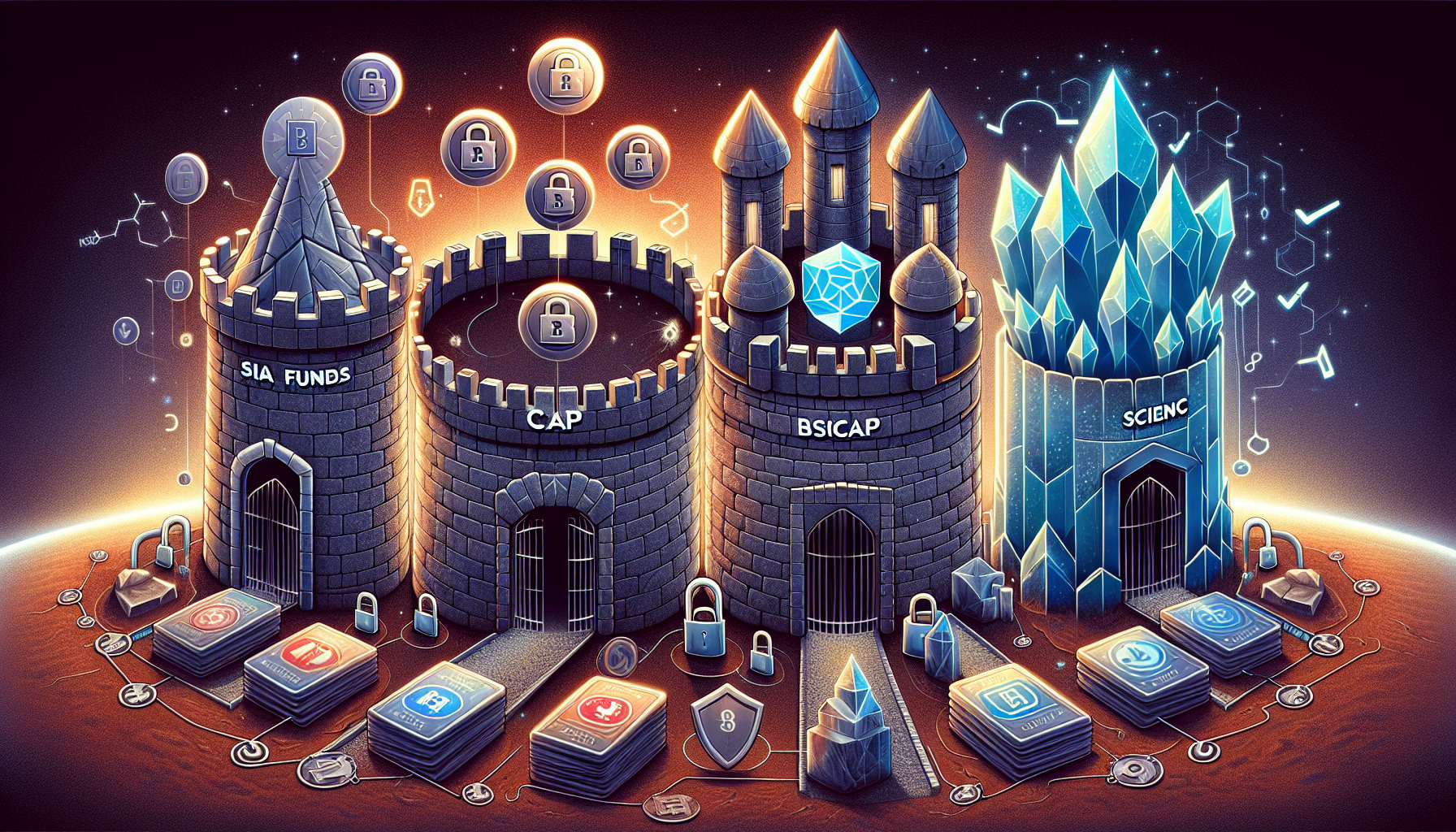Short Answer:
Security crypto coins are regulated digital assets offering investments in assets or enterprises, governed by bodies like the SEC. Unlike typical cryptocurrencies, they’re tradable investments with equity or profit-sharing rights, secured cryptographically. Types include equity, debt, and asset-backed tokens.
Introduction & Background
In a digital era where investment landscapes are evolving at an unprecedented pace, the advent of security crypto coins presents a groundbreaking shift. As a corporate lawyer with over a decade of experience, particularly in major securities and venture capital transactions, my journey through the corridors of prestigious firms like Lowndes, Drosdick, Doster, Kantor & Reed, P.A., and Locke Lord LLP, has equipped me with a keen insight into the intricacies of regulatory frameworks and their impact on investments. This unique vantage point is what I bring to the table as we delve into the world of security crypto coins, a realm where the traditional meets the digital in a regulated symphony.
Security crypto coins, or security tokens as they’re often called, stand at the forefront of merging digital innovation with investment security, governed by stringent laws and overseen by regulatory giants like the SEC. Through this article, I aim to unravel the layers of security crypto coins, showcasing their significance, regulatory compliance, and the safeguarding of investor interests in the digital age.
Key Takeaways
-
Security crypto coins, or security tokens, are regulated digital assets that represent investments subject to securities laws, and offer features akin to traditional financial securities such as equity, profit sharing, or voting rights.
-
The integrity of the crypto industry heavily relies on strong security measures, and regulation plays a critical role in establishing a legal framework to mitigate threats such as private key theft and financial crimes.
-
Evaluating the security of crypto coins involves analyzing their underlying technology, security protocols, track record, and transparency, as well as considering the security features of the involved crypto exchanges and wallets.
Defining Security Crypto Coins
Envision a digital key that can open a world of investments. This is what security crypto coins, also known as security tokens, bring to the cryptocurrency regulation table. They are regulated digital assets representing an investment in tangible or intangible resources, ventures, or enterprises. These tokens are governed by regulatory bodies like the SEC, ensuring their issuance and trade are subject to securities laws.
Unlike conventional cryptocurrencies, they are not designed to be currencies but tradable investment instruments akin to equities or fixed income products, regulated by federal regulators, entities such as the Commodity Futures Trading Commission and crypto firms on crypto trading platforms.
Characteristics of security crypto coins
Security crypto coins can be compared to using a digital key to unlock a treasure chest. These tokens meet criteria from the Howey Test, meaning they are investments expected to provide profits predominantly derived from the efforts of others. Often, these coins offer holders equity, profit sharing, or voting rights similar to traditional financial securities.
The transactions within these coins are secured by cryptographic measures, ensuring the transfer of information is accessible only to the intended recipients.
Types of security crypto coins
Similar to the variety found in traditional securities, security crypto coins also come in numerous types. They include equity tokens, debt tokens, and asset-backed tokens.
Equity tokens are akin to traditional stocks, providing investors with dividends, voting rights, or a stake in the issuing company. Debt tokens represent loans or debt obligations with terms such as pre-defined interest rates. Asset-backed tokens tokenize real-world assets like real estate or bonds, offering investment opportunities and rights in the underlying assets.
Comparison with other digital assets
Not all digital assets are created equal. While all cryptocurrencies are digital assets, the same cannot be said in reverse. Digital assets can take many forms, including:
- Non-fungible tokens (NFTs)
- Digital art
- Music
- Virtual real estate
However, security tokens differ from other digital assets in their purpose, design, and regulatory treatment.
They represent actual ownership and investment stakes, aligning more closely with traditional financial securities than with utility tokens or cryptocurrencies. Think of them as a bridge between the world of traditional finance and the futuristic realm of digital assets.
Importance of Security in the Crypto Industry

In the realm of digital assets, security is a necessity, not a luxury. The crypto industry employs blockchain and cryptographic techniques to safeguard transactions against fraud and unauthorized actions. This ensures that only the intended recipients can access the encrypted data, thereby adding a layer of security that is paramount to the functioning and credibility of the crypto industry.
Common security threats in the crypto space
In the expansive cosmos of crypto, threats emerge as potential private key theft, risks tied to custodial wallets, and irreversible transactions. The pseudo-anonymity inherent to crypto assets also enables activities like money laundering and terrorist financing. As a result, the need for crypto laws becomes increasingly important to address these issues.
Add to this the disparate regulatory frameworks and operations of crypto exchanges in jurisdictions with limited oversight, and you have a potent mix of threats that can significantly compromise the security of your digital assets.
Consequences of poor security measures
The consequences of inadequate security measures in the crypto industry can be financially devastating. Security breaches at cryptocurrency exchanges can result in the loss of substantial amounts of digital currency and undermine trust in the crypto ecosystem. Moreover, the irreversible nature of cryptocurrency transactions means that mistakes cannot be corrected, leading to the permanent loss of investment if private keys are lost or transactions are made incorrectly.
Furthermore, poor security measures can lead to significant disruptions in cryptocurrency exchanges during market turbulence, potentially destabilizing the financial system as digital assets become more mainstream.
Role of regulation in ensuring security
Regulation plays a vital role in maintaining security in the crypto industry. Crypto regulation, enforced by regulatory bodies such as the Securities and Exchange Commission (SEC), provides a clear legal framework for crypto companies, ensuring compliance and preventing financial crimes. Compliance with these regulations not only enhances a cryptocurrency’s reputation but also demonstrates its commitment to adhering to security standards.
Moreover, self-regulatory organizations contribute to industry stability by creating the rules and guidelines that address new developments, although they must work in concert with the Financial Industry Regulatory Authority and government bodies to prevent market manipulation and fraudulent activities.
Evaluating the Security of Crypto Coins
Much like how a jeweler assesses a diamond based on its cut, clarity, color, and carat weight, the security evaluation of crypto coins entails scrutinizing several key facets. This includes the underlying technology, consensus methods, track record, and transparency of the coin.
Blockchain technology forms the backbone of cryptocurrency security, while consensus methods like proof-of-stake reduce the risk of certain attacks and ensure that transaction validation is undertaken by trustworthy network participants.
Security protocols and technologies
Beneath the surface of a secure crypto coin lies a multitude of security protocols and technologies. Some of these include:
- Blockchain technology, which provides a decentralized and immutable ledger for transactions
- Cryptographic security measures, which ensure that information and communication regarding transactions are only accessible to authorized individuals
- Consensus mechanisms like Bitcoin’s Proof of Work and Ethereum’s Proof of Stake, which play a crucial role in securing the network against potential attacks.
Advanced cryptography and smart contracts in currencies like Cardano add another layer of security and privacy for users.
Track record and reputation
In the crypto sphere, a coin’s history and standing can act as markers of its security. A cryptocurrency demonstrating a history of stability and consistent growth is generally regarded as a more secure investment. Furthermore, the reputation of a cryptocurrency is positively influenced by its demonstrated ability to withstand attacks and the involvement and efficiency of its community and development team.
For example, Bitcoin is known for its resilience, while Monero is recognized for its commitment to privacy and security.
Transparency and accountability
The twin pillars of transparency and accountability reinforce the security of a crypto coin. These factors can be gauged by examining factors like:
- the team’s history
- technology impact
- partnerships
- the implementation of protocols like Xriba.
Furthermore, blockchain technology offers:
- Immutable audit trails, which provide transparency and accountability for all activities and data transfers in cloud environments
- Continuous monitoring
- Regular security audits
- Educating users on security best practices
These measures are crucial for enhancing transparency and accountability in accordance with existing laws.
Top Security Crypto Coins to Consider

As one navigates the realm of security crypto coins, the question of which coins are worthwhile for investment might arise. Secure crypto tokens such as Sia Funds, Bcap, and Science Blockchain exemplify robust security measures, regulatory compliance, and transparency. These tokens are the epitome of secure digital assets, providing investors with a sense of trust and stability within the crypto market.
Bitcoin
Bitcoin, the first and most well-known cryptocurrency, offers a decentralized system and robust encryption for secure transactions. Its key features include:
- Decentralization
- Robust encryption for secure transactions
- Transaction fees, which grow in importance as block rewards diminish over time due to halving events
Ethereum
Ethereum’s security is leveraged by its underlying blockchain technology, providing a decentralized and tamper-proof ledger for transactions. Its shift to a Proof of Stake consensus mechanism is aimed at maintaining network security while reducing energy usage and preventing potential control of the network by malicious entities.
Monero
Monero, created in 2014 as a fork of Bytecoin, puts a strong emphasis on privacy. It addresses privacy concerns found in other cryptocurrencies, making it a favorite among those who prioritize security and privacy in their digital transactions.
Zcash
Zcash, a privacy-centered fork of Bitcoin, integrated a form of zero-knowledge proof called zk-SNARKS to enhance privacy. With Zcash, users can opt to hide the sender, recipient, and transaction value for their transactions, providing complete privacy without compromising security.
The Role of Crypto Exchanges and Wallets in Security

Crypto exchanges and wallets play the role of custodians for your digital assets. Their role in maintaining the security of your investments cannot be overstated. Secure cryptocurrency exchanges handle significant volumes of capital and are frequent targets for cybercriminals. As such, they employ protective features like Registry Lock, Two-factor Authentication, and web protocol security features to defend against a range of cyber attacks.
They also integrate cold wallets, providing robust security by storing cryptocurrencies offline, thus making them less vulnerable to hacking.
Features of secure crypto exchanges
Navigating the landscape of crypto exchanges can seem akin to traversing a labyrinth. However, knowing what security features to look for can guide you to the safest choices. Secure exchanges incorporate features like:
- Multi-signature options
- Robust encryption for keys and transaction data
- Biometric authentication for access
- Regular software updates
They also adopt web protocol security, implement DNS Security Extensions, and put up defense systems against DDoS attacks to protect their services and users.
Best practices for selecting a safe wallet
Consider your digital wallet as your private treasury for safeguarding your digital assets. Choosing the right one can significantly impact the security of your assets. Best practices for selecting a safe wallet include:
- Choosing the right type of storage—hot (online) or cold (offline)
- Ensuring robust encryption and multi-factor authentication
- Selecting wallets from established providers with a proven security track record.
Strong password practices and recovery measures are also critical for maintaining the security of your wallet.
Cold storage vs. hot storage
In the sphere of crypto wallets, deciding between cold and hot storage parallels the choice between a bank vault and a wallet you carry around. Cold storage offers excellent security against online threats, keeping your cryptocurrencies offline. Meanwhile, hot storage offers convenience for frequent transactions but faces higher cybersecurity risks due to potential online vulnerabilities.
The choice between the two boils down to your security needs versus the convenience of access, with the option to use both for a balance of security and accessibility.
Future Trends in Security Crypto Coins

What can we anticipate for the future of security crypto coins? We can expect to see:
- Increased use of smart contracts
- Greater regulatory compliance
- Advances in cryptographic techniques
- Refinement of consensus algorithms
As blockchain interoperability increases, so too will security measures, enabling more robust and diverse defense mechanisms across different blockchain systems.
Decentralized finance (DeFi) and security
The ascent of decentralized finance (DeFi) is moulding the future trajectory of crypto security. DeFi promotes self-regulation and enhances security through community-driven governance mechanisms and smart contracts.
Beyond that, innovations in DeFi like decentralized insurance are democratizing access to financial services and providing flexible, affordable coverage options.
Central bank digital currencies (CBDCs)
Central bank digital currencies (CBDCs) are surfacing as a promising digital asset, poised to boost financial inclusion and enhance cross-border payment processes using central bank digital currency. The development of CBDCs is a step-by-step process, with the following stages:
-
Preparation
-
Proof-of-concept
-
Prototypes
-
Pilots
-
Production
Each stage is important in the overall development and implementation of CBDCs.
As a regulatory framework and clarity on DeFi is expected to encourage responsible innovation, CBDCs could play a role in the DeFi space.
Blockchain advancements and their impact on security
Innovations in blockchain technology are poised to transform the security panorama of crypto coins. Blockchain strengthens data security by using cryptographic hashes to ensure data integrity. Moreover, it increases the security of software supply chains by establishing a verifiable, tamper-proof record of software authenticity and provenance.
Summary
We’ve journeyed through the realm of security crypto coins, understanding their characteristics, importance, and how to evaluate their security. We’ve also explored some top security crypto coins, the role of exchanges and wallets in maintaining security, and future trends in the space. As the crypto industry continues to evolve, security will remain a critical component. Understanding and prioritizing security in your crypto investments is not just a smart move—it’s an essential one.
Frequently Asked Questions
Are crypto coins a good investment?
Cryptocurrencies can be risky due to their volatility, so it’s important to consider your risk tolerance before investing in them. If sudden price swings make you uncomfortable, they may not be suitable for you.
Which crypto has the best security?
Ethereum is considered the most secure cryptocurrency due to its use of blockchain technology, making it a robust option for digital transactions.
Which crypto coins are securities?
The US Securities and Exchange Commission considers almost all cryptocurrencies to be securities, with bitcoin being the only known exception. Ripple (XRP), Telegram’s Gram (TON), LBRY Credits (LBC), OmiseGo (OMG), DASH (DASH), Algorand (ALGO), Naga (NGC), and Monolith (TKN) are a few examples of cryptocurrencies classified as securities.
What role do crypto exchanges play in security?
Crypto exchanges play a vital role in maintaining the security of crypto coins by implementing protective features like Registry Lock and Two-factor Authentication to defend against cyber attacks.
What is the difference between cold storage and hot storage?
Cold storage keeps cryptocurrencies offline for better security against online threats, while hot storage stores them online for convenient frequent transactions, with average cybersecurity.



